UNIT10:Living in a Foreign Country
During the time I was living in the foreign country, I realised that
living abroad does more for you than just being bilingual; it enables
you to form new relationships and to learn about the real culture
of a country. I never returned to the United States, but I will never
forget this memorable experience in my life.
Kayitesi
My goals
After studying this unit, I will be able to:
⦿ Describe recent activities, current activities, possibilities, plans and
future activities.
⦿ Compare cultures and describe emotions.
⦿ Read a letter from someone living in a foreign country.
⦿ Write sentences using ‘may’, ‘might’, ‘could’.⦿ To use: ‘can’, ‘may’, ‘have to’, ‘paragraphs’, ‘more’, ‘fewer’, ‘no’.
Describing recent activities
y Language useActivity 1
Discussion
Share with your classmates these questions.
(a) What is your dream destination?
(b) What have you heard about people who go to Europe or
America, or any other countries outside Rwanda? Describe
their experiences in those countries.
(c) Why do you think most people would love to visit those
countries?
(d) If you have ever travelled to Europe or America or any
other country overseas, describe to your classmates what
you saw. If you have never travelled there, visit the internet
facility of your school’s computer laboratory. Search about
a country overseas you would love to visit and find the
interesting details you would see. Describe those things toyour classmates
Activity 2
Discussion
Study the following photographs carefully that show New York City
in the United States of America and the City of London in the United
Kingdom. Describe what you see in each photograph and compare thetwo cities
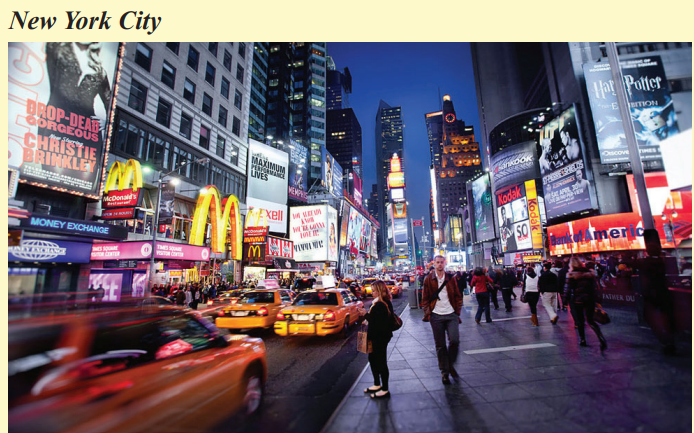
Activity 3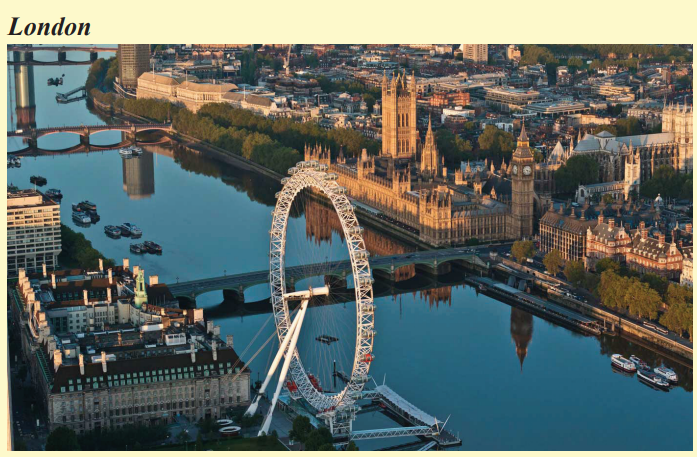
Look at the child in the picture holding the Rwanda national flag andUnited States of America flag. What message does the girl communicate?
Activity 4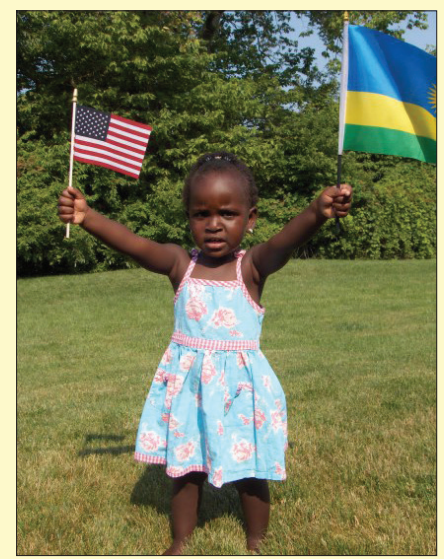
Read the letter below carefully and compare the life in Rwanda with
that in the United States of America. Choose a secretary to present
your findings to the class for further discussion and comparison of your
answers.
My dear friend,
Thank you for the email. I stay with an aunt who has been living
in the United States since she was eighteen years old and she invited
me to stay with her many times. One day I decided to go. Staying
with her and her family was one of the greatest experiences in my
life. Besides learning a new language, I made new friends and Ireally got into the culture of a great and beautiful country.
When I arrived there, I got very excited. First, I was excited because
it was my first time in a foreign country, and second because I was
going to experience something really new in my life. On the other
hand, learning English wasn’t an easy process because my aunt used
to speak just Portuguese with me; I used to take English classes just
twice a week and all the students were foreign too. My experience
of learning English in a regular course was limited to this little
experience and a short period taking English as a second language
at the local college. Thus, from that period until the end of the time
there, I learnt the language with the people from the city and the
new friends I had met.
Besides the experience of studying a new language, making new
friends was the best aspect of living abroad. I had a girlfriend who
lived in a beautiful city by the Pacific Ocean and I used to spend
every weekend with her. We used to go out often and one of these
times I met my first American boyfriend. He was handsome and
very kind and we had a great time together. He took me to many
interesting places and showed me the authentic American way of
life by introducing me to his family, his friends and his culture.
Moreover, going out constantly and talking to him helped me to
improve the skills with the language and mainly to be familiar with
the American people and their habits and customs.
Another great experience I had was working as a babysitter. Once
I read in the newspaper an advertisement looking for a foreign girl
to take care of two children. At first I got really scared about the
big responsibility of taking care of two children, but I decided to
live this new adventure. The family’s house was in a very nice place
by the ocean and the children were very cute and curious about my
“weird accent”. In spite of the fact that this new experience wasn’t
easy due to my lack of practice at that time, everything went well
and the whole situation was very meaningful to my life.
During the time I was living in the foreign country, I realised that
living abroad does more for you than just being bilingual; it enables
you to form new relationships and to learn about the real culture
of a country. I never returned to the United States, but I will never
forget this memorable experience in my life.
KayitesiDebate the motion as a class
“Living in Rwanda and living in Europe; which do you prefer?” Give
reasons for your opinions.
Procedure for the debate
Activity 5
1. Ten people will take part in the debate. Five students will support
the motion and the other five will be against it.
2. Elect a chairperson, timekeeper and secretary to moderate the
debate. The timekeeper will help the speakers keep time; The
secretary will record what is said and announce the results; the
chairperson is the overall person in charge of moderating the
debate session.
3. Each speaker should prepare their points for debating well in
advance.
4. Each speaker should use three minutes. Points of information,
order, clarification, etc. will be raised and the chairperson will
decide which to allow or reject.
5. The rest of the class should listen attentively while taking notes.
6. The chairperson will choose a few students from the audience to
debate (propose or oppose) the motion.
7. The secretary will read the summary points from the audience to
agree or disagree with the motion. The secretary will declare the
side with majority points the winner.8. Finally, the chairperson will close the debate.
Describing current activities
Present continuous tense
Activity 1
Look at the photograph below of Imperial College in
London and read the sentence below it
Discuss with a classmate the meaning of the sentence. Use the sentence
to explain the time of the action in the present continuous tense.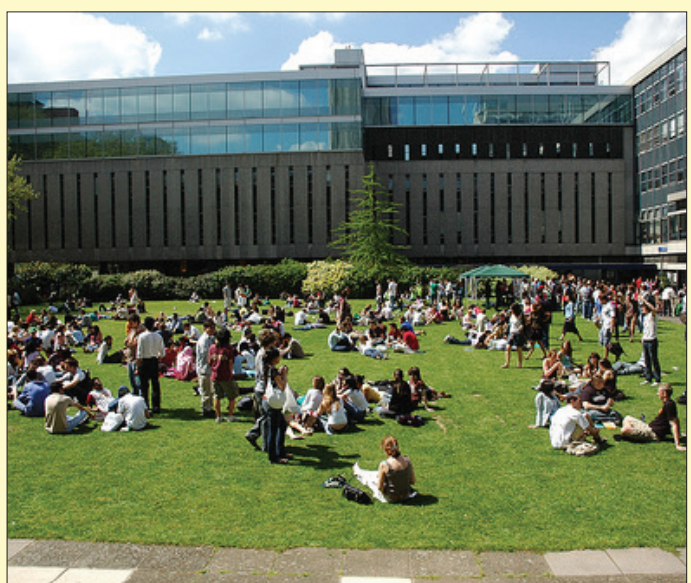
Imperial College in London
I am studying at Imperial College in London. (Is the speaker still at thecollege or not?)
Exercise
Below are some of the sentences extracted from the letter you read above.
Rewrite them in the present continuous tense. Share your answers with
your classmates.
1. I stay with an aunt who has been living in the United States since
she was eighteen years old.
2. I made new friends and I really got into the culture of a great and
beautiful country.
3. I was excited because it was my first time in a foreign country.
4. I used to take English classes just twice a week.
5. I learnt the language with the people from the city and the new
friends I had met.
6. I used to spend every weekend with her.
7. He took me to many interesting places and showed me the
authentic American way of life by introducing me to his family,
his friends and his culture.
8. Moreover, going out constantly and talking to him helped me to
improve the skills with the language and mainly to be familiar
with the American people and their habits and customs.
9. I was working as a babysitter.
10. I realised that living abroad does more for you than just being
bilingual.
Describing possibilities
Activity 1
Study the photographs and read about London.
Attractions that will amaze you about this wonderful
city in the world.
There are things that would catch your eye if you visited London
and leave you speechless regarding the great architectural designs of
buildings. From the modern Coca-Cola London Eye, to the historic
Tower of London, London’s top 10 tourist attractions are a must-see on
any London sightseeing trip. Even better, many London landmarks are
free to visit. There are also plenty of children-friendly places to visit in
London, such as the SEALIFE London Aquarium and Kensington’sScience Museum.
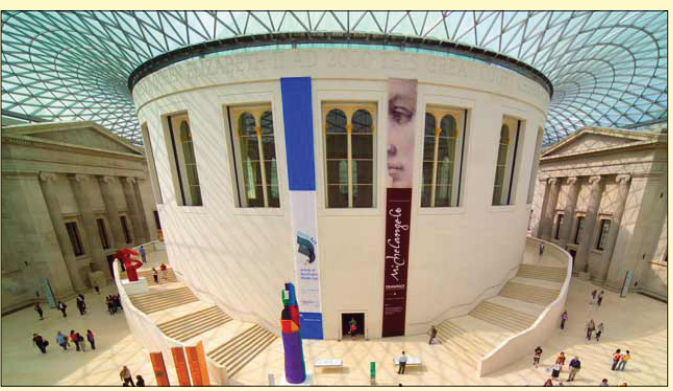
(Source: British Museum)
Founded in 1753, the British Museum’s remarkable collection spans over
two million years of human history. You will enjoy a unique comparison
of the treasures of world cultures under one roof, centred around the
magnificent Great Court
World-famous objects such as the Rosetta Stone, Parthenon sculptures,
and Egyptian mummies are visited by up to six million visitors per
year. In addition to the vast permanent collection, the museum’s
special exhibitions, displays and events are all designed to advance
understanding of the collection and cultures they represent. Some of
the facilities in this wonderful museum are: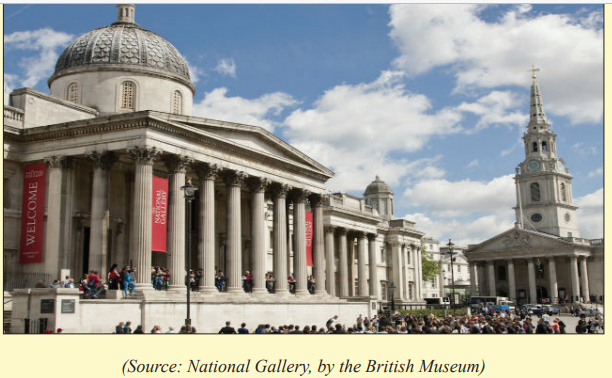
The crowning glory of Trafalgar Square, London’s National Gallery, is
a vast space filled with Western European paintings from the 13th to the
19th centuries. Here, you will find works by the finest art masters suchas Van Gogh, Da Vinci, Botticelli, Constable, Renoir, Titian and Stubbs.
As well as the permanent (and permanently fascinating!) dinosaur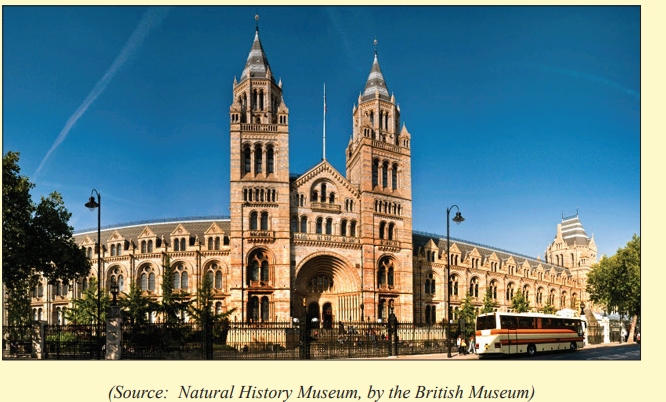
exhibition, the Natural History Museum boasts a collection of the
biggest, tallest and rarest animals in the world. Here you will see a
life-sized blue whale, a 40-million-year-old spider, and the beautiful
Central Hall.
(Source: Tate Modern, by the British Museum)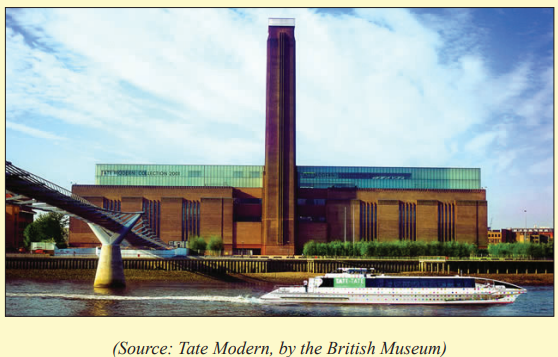
Sitting grandly on the banks of the Thames is Tate Modern, Britain’s
national museum of modern and contemporary art. Its unique shape is
due to it previously being a power station. The gallery’s restaurants offerfabulous views across the city.
The Coca-Cola London Eye is a major feature of London’s skyline. It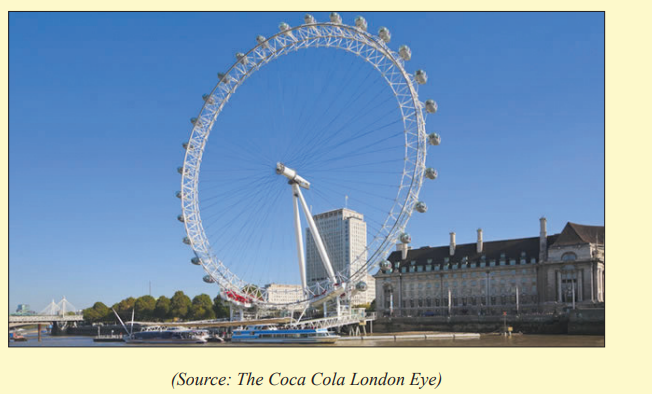
boasts some of London’s best views from its 32 capsules, each weighing
10 tonnes and holding up to 25 people. Climb aboard for a breathtaking
experience, with an unforgettable perspective of more than 55 ofLondon’s most famous landmarks – all in just 30 minutes!
From the future of space travel to asking that difficult question: “Who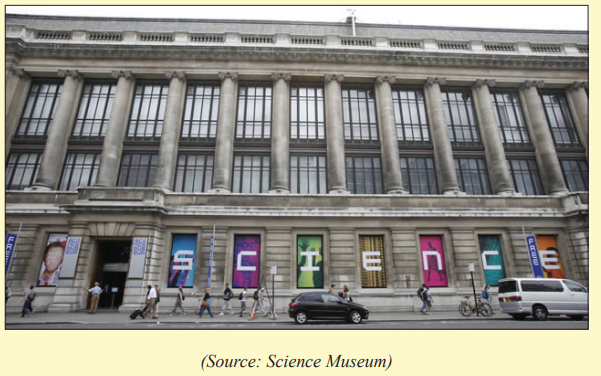
am I?”, the Science Museum makes your brain perform Olympic
standard mental gymnastics. See, touch and experience the major
scientific advances of the last 300 years; and don’t forget the awesomeImax Cinema.
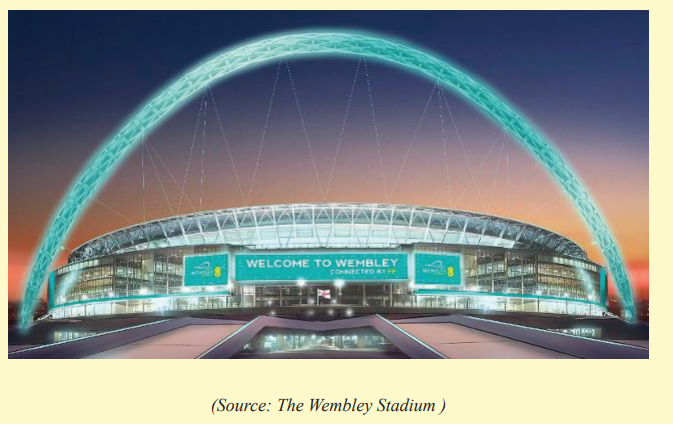
Take the unforgettable Wembley Stadium tour. Go behind the scenes into
England’s changing rooms. Walk in the footsteps of legends, through
the players’ tunnel towards the hallowed turf. Stand triumphantly in
front of the Royal Box with The Cup. Until your dream of playing at
Wembley comes true, the only way to experience all this and more is
to book your Wembley Stadium tour now.
The tour also includes ‘The FA150 Exhibition’ celebrating the history of
the Football Association’s tenure as the original governing body of the
world’s most popular sport. The exhibition includes the Original Rules
of Association Football from 1863 and the 1966 Jules Rimet Trophy(aka The World Cup)
Using ‘may’, ‘might’, ‘could’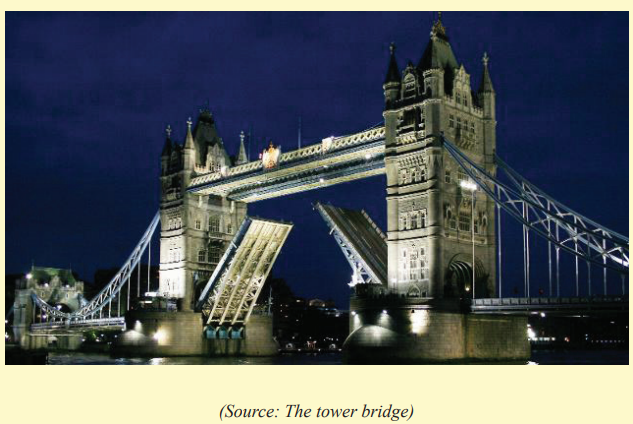
Activity 2
After reading the passage, identify the places you would love to tour
and the things you would do in those places. Form sentences using may
might, could. Use the example below to guide you. Share your answerswith your classmates.
1. I might stay in London.
2. I could study in York.
3. I may rent a room at the university.
Grammar highlight: The modal verbs ‘might’, ‘could’, ‘may’ show ideas
of possibility or permission. Others, like ‘must’, ‘have to’ show obligation.‘Can’ shows ability. ‘Should’, ‘ought to’ are model verbs of advice.
Describing plans
Activity 1
Great Britain, also known as the United Kingdom, comprises four
countries, namely England, Scotland, Northern Ireland and Wales.
The photographs below show some of the cultural aspects and themountainous nature of Scotland. Study them and describe what you see.
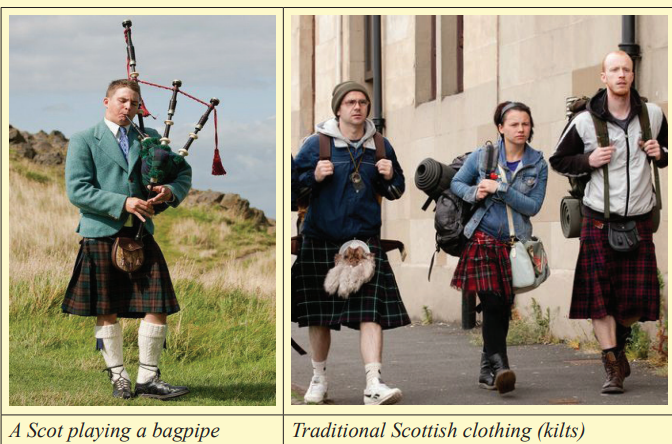
Activity 2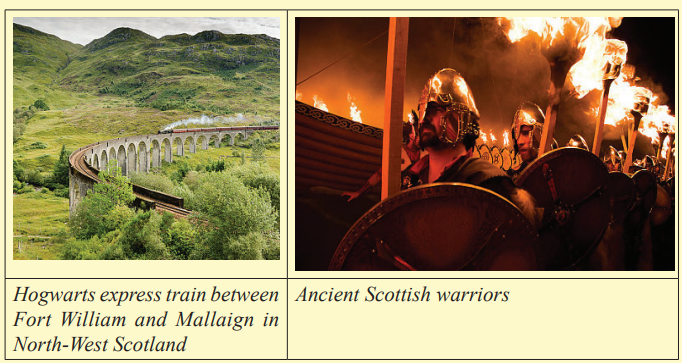
Carry out research about the interesting culture and social life in
Scotland. Assume you are living in Scotland. Use your research to write
a letter describing the interesting places to visit and social life to explore.Exchange your letters so that you can read through and compare them.
Describing future activities
Activity 1
Read this statement with a classmate. What is the time the action will
be taking place?
Examples
(a) I will be climbing mountains in Scotland.(b) She will be having a drink with her friends.
Activity 2
Rewrite the following sentences in the future as shown
in the examples above
1. I visit St. Mungo’s tomb every Friday.
2. We shall go to Glasgow Cathedral next week.
3. Mary Queen of Scots granted the lands of Provand to William
Baillie, a canon of the Cathedral.
4. The visitor enjoyed the experience of the Glenmorangie Distillery
tour.
5. You may have to retrain yourself!
6. The children will arrive in the royal yacht Britannia which is
perhaps the most famous ship in the world.
7. She has served the British royal family for over 40 years.
8. Guests are piped aboard via the Royal Brow and taken on a tour,
then welcomed into the State Apartments where they can enjoy
cocktails and canapés.
9. We will visit the historic Melrose Abbey.
10. The wheel will swing in the Tamfourhill area of Falkirk.
11. We will meet each other at Kelvingrove Art Gallery.
12. The tourists will visit the Melrose Abbey on Thursday.
13. We shall surf the Glasgow Science Centre on the internet.14. We will watch Blair Drummond Adventure on television
Comparing cultures
Activity 1
Discussion
Share your opinions about these questions.
(a) Compare the social and cultural lifestyles of Rwanda with
the Western lifestyles.
(b) Do you think there are certain customs we can borrow from
the Western countries into our cultures? Which ones?
(c) Describe the impact that Western cultures have had on our
cultures.
Choose a secretary to present your findings to the class for furtherdiscussion and comparison of your opinions

The English always say ‘sorry’. They queue up for buses
Activity 2
Read the two passages below carefully
Culture and social etiquette in the United Kingdom
There are no strict etiquette rules that you have to stick to when in the
UK. It is advisable, however, to demonstrate decent manners and respect
to the local culture and traditions.
The first, and most important step, is to be aware of the clearly distinct
nations which form the UK. The United Kingdom of Great Britain and
Northern Ireland consists of England, Scotland, Wales and Northern
Ireland. The citizens of any of these countries may be referred to as
“British”. This term is also the safest to use when not certain of a
person’s heritage. When certain of heritage, you are free to call the
different residents as follows: English, Scot, Welsh or Irish. While the
four countries share many customs, each has its own set of traditionsand history.
Greetings and meetings
When first meeting a Briton, he or she may seem reserved and cold, but
that is just an impression. In reality, they are very friendly and helpful to
foreigners. A handshake is the common form of greeting, but try to avoid
prolonged eye contact, as it may make people feel ill at ease. Use last
names and appropriate titles until specifically invited to use first names.
It is proper to shake hands with everyone to whom you are introduced,
both men and women; the appropriate response to an introduction is“Pleased to meet you”.
Time and punctuality
British people are very strict when it comes to punctuality. In Britain
people make a great effort to arrive on time, so it is considered impolite
to be late, even by a few minutes. If you are delayed, be sure to inform
the person you are meeting. Here are some situations when you are
obliged to be on time, as well as some situations when it is advisable:
• For formal dinners, lunches, or appointments you always come at
the exact time appointed.
• For public meetings, plays, concerts, movies, sporting events,
classes, church services, and weddings, it’s best to arrive a few
minutes early.
• You can arrive any time during the hours specified for teas,
receptions and cocktail parties.
The British often use expressions such as “drop in any time” and “come
see me soon”. However, do not take these literally. To be on the safe
side, always telephone before visiting someone at home. If you receive
a written invitation to an event that says “RSVP”, you should respondto the sender as soon as possible, whether you are going to attend or not
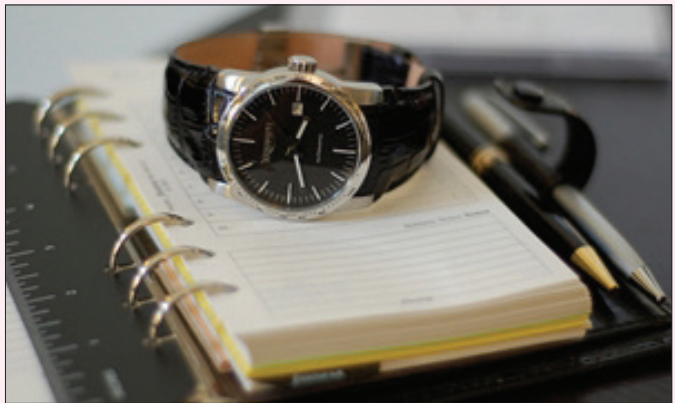
Body language and dress code
British people are not very keen on displaying affection in public.
Hugging, kissing and touching are usually reserved for family
members and very close friends. You should also avoid talking loudly
in public or going to extremes with hand gestures during the course of
communication. The British like a certain amount of personal space. Do
not stand too close to another person or put your arm around someone’s
shoulder.
When it comes to clothes, there are no limits and restrictions on how to
dress. Just make sure that you respect the general rules when in formal
situations. Observation will reveal that people in larger cities dress
more formally, especially in London. Men and women wear wools and
tweeds for casual occasions. Slacks, sweaters and jackets are appropriate
for men and women. Do not wear a blazer to work -- it is country or
weekend wear. On formal occasions, always select an outfit that fits the
dress code. When attending a holiday dinner or cultural event, such as
a concert or theatre performance, it is best to dress formally.
General advice
Men should open doors for women and stand when a woman enters
a room, although it is generally accepted for men and women both to
hold the door open for each other, depending on who goes through the
door first.
It is important to respect the British desire for privacy. Don’t ask personal
questions about family background and origin, profession, marital status,
political preferences or money issues. It is considered extremely impolite
to violate a queue, so never push ahead in a line. It is also considered
very rude to try to sound British or mimic their accent.
Remember that humour is ever-present in English life.
It is often selfdeprecating, ribbing, sarcastic, sexist or racist.Try not to take offence.
Cultural etiquette dictates that when invited to someone’s home, you
should bring a small gift for the hostess. Give flowers, chocolates, wine,
champagne or books. Feel free to express your gratitude and delight with
the visit on the next day with a note or a telephone call.
Women’s rules
Women in Britain are entitled to equal respect and status as men, both
at work and daily life. The British have the habit to use ‘affectionate’
names when addressing someone, so do not take any offence if they
call you love, dearie, or darling. These are commonly used and not
considered rude.
It is acceptable, but may be misconstrued, for a foreign woman to invite
an English man to dinner. It is best to stick with lunch. Also, if you would
like to pay for your meal, you should state it at the outset.(Source: Kirina Boykova / Expatica
Describing cultures
Describing Rwandan culture
Greetings are a central part of social etiquette in Rwanda. In rural areas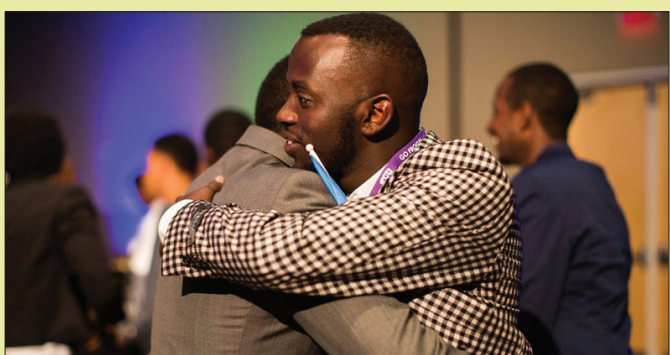
it is important to greet everyone that passes your way – MWARAMUTSE
(in the morning) and MWIRIWE (in the afternoon). People shake hands
with the right hand. Friends often lay a hand on the other’s hip while
the right hand touches the shoulder. To show respect of social status
people hold their right forearm with their left hand while shaking hands.
Men often share a touching of the sides of their foreheads, first right,
than left. Holding hands between people of the same sex is a sign of
friendship. When two people of the opposite sex talk there is very little
to no touching. When a man is greeting a woman it is best to wait for
the women to extend her hand.
Eye contact might be more indirect during a conversation; women and
children might look down or away to show respect.
It is best to avoid asking about someone’s ethnicity or making referrals
to the civil war. Almost every Rwandan has a story related to the 1994
genocide, a trauma so severe that it is difficult for many to cope with,
which is why it is improper to ask people what happened to them. Many
lost loved ones. Good topics of conversation include food, sport (soccer,
running), Rwanda’s landscape, Australia, etc. Rwandans love a goodjoke but avoid sarcasm as it might not translate.
In many situations people are flexible with appointed times, they don’t
tend to be overly punctual. This is different in business situations where
punctuality is valued.
Rwandan people have a set of gestures for pointing to and calling
people. If you want to point to someone hold out the arm with the palm
open and upward. It is considered very rude to point at a person with
your index finger. Calling someone to come over is done by extending
the arm with the palm turned down and bringing in the fingers towards
you, like a scratching motion. Rwandans also have proper ways to give
or receive things. Children learn to offer both hands when receiving an
object, especially form an adult, which shows respect.
The family unit in Rwanda includes husband, wife and children. People
from several related households comprise another kinship. The eldest
or most influential male is considered the head of this unit. Marriage is
very important as marriage and having a child mark a person’s transition
to full adulthood. To get married one has to pay a price for his bride
to her father. Ritual occasions such as weddings serve as important
recreational functions. Having children is very important, because dying
without having them means that no one will honour the deceased’s
spirit. Children who receive the privilege of education are expected to
financially assist the family later.
Clothing is very European but mostly second-hand as not many can
afford to buy new clothes. Rwandan people place great importance
on looking their best and take great pride in their appearance. Men
always wear long pants as shorts are only worn by young children and
schoolboys. In most rural areas, women have to wear clothing that
covers their legs.
Diet is high in starches and low in protein and fat. The most common
foods are various banana types, potatoes and beans (sometimes fish).
Meat is eaten very rarely. The most common is goat while beef is the
most desired but will only be available when someone has sacrificed a
bull or cow on a ceremonial occasion. Cattle are valued as a source of
prestige and milk. While food is not always offered to guests, drinks are.
It is seen as an insult not to offer a drink where others are drinking. Be
aware that it is not accepted for some women to drink alcohol. Bread,coffee and tea are popular for breakfast.
Activity 3
Summary writing
In about 100 words, make a comparison and contrast summary about the
cultural lifestyle of Britons and Rwandans based on the two passages
you have read. Compare your summaries with those of your classmates.
Activity 4
Research and essay writing
Conduct research about the cultural lifestyles (greeting, food, clothing
etc.) of another country of your choice. Compare their customs with
those of Rwanda. Compare your findings with those of your classmates
Talking about emotions
Letter writing
Activity 1
Assume you are in Europe. Use one of the countries you researched
about, and write a friendly letter describing the experiences and the new
life you are living. Compare your letters with those of your classmates.
References
Bishop, G. (1985). Curriculum Development: A Textbook for Students, London:
Macmillan
Carter, R., McCarthy (2006). Cambridge Grammar of English: Cambridge
University Press
Harmer, J. Edinburgh Gate (2001). The Practice of English Language Teaching:
Longman (3rd Ed)
Hancock, M. (2003). English Pronunciation in Use Intermediate (Audio CDs).
Cambridge: Cambridge University Press (book with CDs can be obtained
from Ikirezi Bookshop, Kigali)
Kadeghe, M. (2009). English for Tanzania Secondary Schools: Grammar and
Functional English, Dar es Salaam: Afroplus Industries Ltd.
Ladefoged, P. (2000). Vowels and Consonants, Oxford: Blackwell
Lucy, P. Mair. ‘African Marriage and Social Change.’ In: Survey of African
marriage and family life. Edited by Arthur Phillips, (London, Oxford
University Press, 1953) p.14
National Curriculum Development Centre (2010). Curriculum of English Language
for Primary Schools in Rwanda
National Curriculum Development Centre, Kigali, Ministry of Education, (2010),
Ordinary Level English Program
Roach, P. (2000). English Phonetics and Phonology, 3rd ed. Cambridge: Cambridge
University Press
Roach P. et al (eds.). (2003). Daniel Jones English Pronouncing Dictionary, 16th
ed, Cambridge: Cambridge University Press
Swan, M and Walter, C. (1998). The New Cambridge English Course.
Cambridge: Cambridge
Swan, M. (2005). Practical English Usage, New York: Oxford University Press
